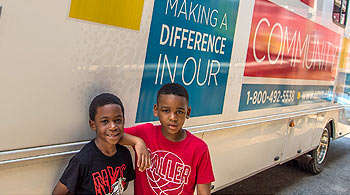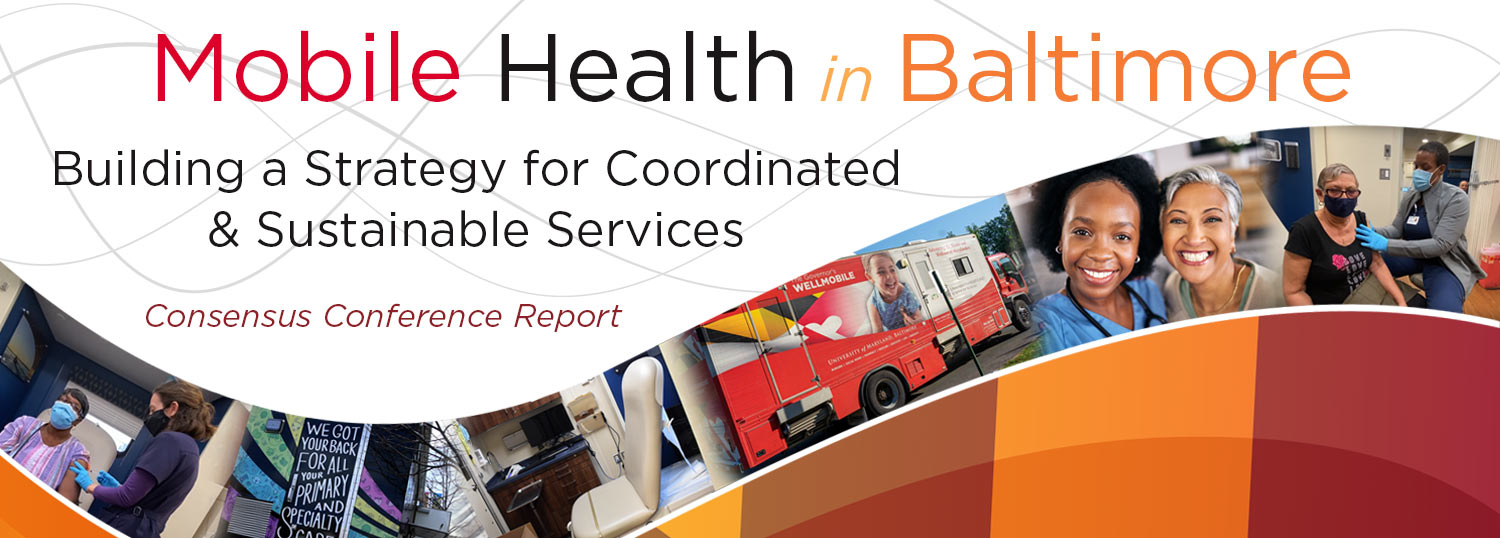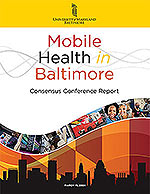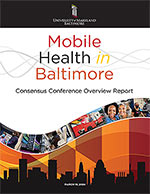Conference participants were united in their desire for greater coordination, collaboration and integration of mobile health care delivery for underserved populations in Baltimore city. The synthesis of input and ideas from conference participants, panel experts and speakers as well as from post-conference survey respondents resulted in five specific recommendations. These recommendations provide a road map for enhancing and sustaining mobile health care in Baltimore.
RECOMMENDATION 1:
Board of Representatives
Establish a board of representatives from each healthcare system along with community partners to provide oversight for a city-wide mobile health effort that will include a central operational unit to coordinate services.
The City of Baltimore will establish a Mobile Health Care Board for Baltimore that will guide joint mobile health care efforts and coordinate data sharing and sustainable funding. The board will:
- Include representatives from all participating healthcare systems and collaborating community, government, nonprofit, business and academic partners.
- Include voices from the community for the planning and strategic operation of mobile health care.
- Collaborate to establish central strategic health priorities for the mobile health care effort (e.g. hypertension screening, diabetes screening etc.) based on community health assessments undertaken by the city’s healthcare systems and Health Department.
- Work with medical systems, city agencies, state legislature, Medicaid Care Organizations and other payors to support this effort with sustained funding.
The Mobile Health Care Board will establish, identify and collaborate on a central, coordinating operations center for mobile health care. The operations center will:
- Identify best place or agency for alignment and ideal infrastructure for sustainability.
- Serve as the central coordination and collaboration body for city-wide mobile health care.
- Consider all potential sites for care delivery (e.g., schools, faith-based communities, community centers, street-medicine etc.)
The Mobile Health Care Board will determine working vocabulary and definitions for mobile health or mobile health care based on national standards. (The term ‘mobile health care’ is likely preferable for mobile and placed-based care delivery platforms and strategies.)
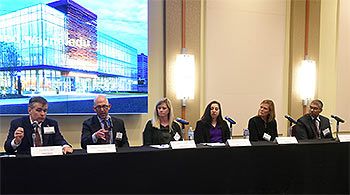
RECOMMENDATION 2:
Healthcare Systems
Integrate mobile health care into the city’s healthcare systems and community to improve coverage, targeting, coordination, and referral for patients who need longer, more complex care.
The city’s healthcare systems will develop improved community health assessments. These assessments will:
- Better incorporate individual and population data on social determinants of health into data systems and use to improve community health assessments.
- Better understand the ‘missing people’ who never or rarely interact with the healthcare system.
The Mobile Health Care Board and operations center should use these improved community health assessments to better coordinate and target mobile health units in order to:
- Determine target populations for mobile units based on demographics, geography, community needs, health conditions, etc.
- Specifically target mobile health care to geographic regions where residents do not regularly engage with the healthcare system (e.g. unhoused encampments, undocumented residents etc.).
- Focus mobile health care on underserved populations and provide a range of services for acute and chronic medical conditions (including primary care and preventive services), behavioral health and addiction medicine. Specialty care, dental, pharmacy and other services will be carefully coordinated by the operations center.
Mobile health care units should:
- Improve training for staff who screen for health-related social needs and refer clients for support.
- Assess and address social drivers of health and establish a closed loop system for assistance with referrals for health-related social needs.
- Provide basic dental care and closed loop dental referrals.
Future mobile health care iterations will include options for cancer screening such as mobile mammography and lung cancer screening (e.g. currently developing partnerships with radiographic industry).
Health systems, nonprofit organizations and mobile health programs will establish pharmacist and community health worker (CHW) partnerships for ideal medication management within the community along the lines of the Detroit/Wayne State model. These partnerships will:
- Deliver preventive care in the most efficient and cost-effective means. (Preventive services do not require a provider encounter.)
- Offer a ‘warm handoff’ between mobile health care and fixed-facility staff and systems; this is an essential part of the model.
The Mobile Health Care Board in collaboration with healthcare systems, nonprofit organizations and payors will identify resources to help patients pay for medications (e.g. uninsured co-pays, deductibles).
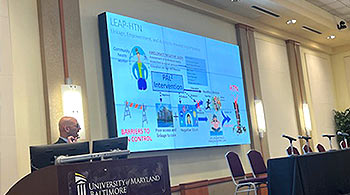
RECOMMENDATION 3:
Long-term Sustainability
Develop plans for long-term sustainability that includes payors, City and State governments.
The Mobile Health Care Board will facilitate further stakeholder discussion about long-term financial sustainability of mobile health care programs. Consider billing, institutional funding, philanthropy, government grants, government appropriations, and other revenue sources.
The Mobile Health Care Board will work with State agencies, e.g. Maryland Health Services Cost Review Commission (HSCRC) and others as well as payors to determine new compensation models for mobile health including Current Procedural Technology (CPT) codes for preventive services, similar to those developed in Michigan by Detroit/Wayne State.
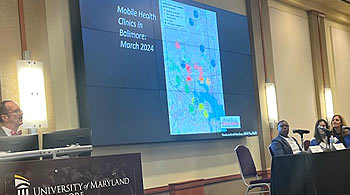
RECOMMENDATION 4:
Data Systems
Establish a means to link data systems to allow transfer of patient information and secure communication between the units providing care and within healthcare systems.
In collaboration with healthcare systems and the State Health Information Exchange (CRISP), the Mobile Health Care Board will:
- Facilitate means to promote electronic medical records interoperability and explore the feasibility of additional technology to secure support communication and referrals across different mobile health care platforms as well as the continuum of the healthcare system.
- Develop a central database that includes best and last contact information for frequently identified patients (e.g., CRISP and/or payors with databases may provide possible options) for secure patient communication and messaging.
- Ensure technology solutions allow operability between all potential sites for care delivery, e.g. schools, faith-based communities, community centers, street-medicine, etc.
- Capitalize on opportunities to establish telemedicine connectivity and referral capability based on community needs, service delivery model, and unit capabilities.
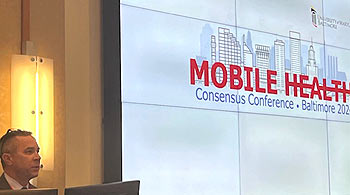
RECOMMENDATION 5:
Community Inclusion
Integrate community health workers and community advocates into all mobile health care efforts.
The Mobile Health Care Board will include voices from the community for the planning and strategic operation of mobile health care in the City.
The Mobile Health Care Board and health systems deploying mobile health care units will consider best practices for incorporating trusted community-based messengers to work with the community.
Operators of mobile health units should support the incorporation and career advancement of community health professionals (e.g., CHWs, doulas, health educators) into mobile health care delivery, including establishing certifications and career pathways for these professionals in the conventional healthcare system. These trusted resources in the community are essential in connecting people to the medical system for care.
As care for the caregivers is an essential component in caring for these underserved populations, mobile health care providers will draw on social, spiritual, and psychological professionals as partners in the work.
